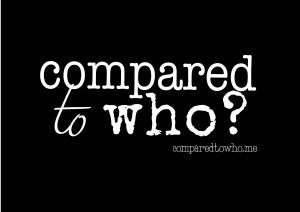Thigh dimples. Belly pooch. Saggy breasts. Stretch marks. We love to see them.
No. Not on our own bodies. Yikes! Certainly not.
We all bear the marks of this fallen world. Well most of us over the age of nineteen do. There are a few fortunate ones out there. (But gravity will find them, too. It always wins.)
There is one place where dimpled skin, frizzy hair, and love handles look really great . . . on the body of a celebrity.
I’m guilty. Stand me in front of the magazine aisle and I’ll reach for the photos of cellulite circled in red (like missed answers on a test). Every time.
Exposés on how those seemingly perfect hot bodies are actually blemished—that’s a good read. Full color pages filled with enlarged images of sun-scarred skin and deflated bosoms are affirming to the average woman’s existence.
The tabloids and celebrity gossip sites–happy to oblige us–will show us as many unflattering pictures of our favorite starlets as they can find. Why? Because they know we’ll look!
Images of flaws on the allegedly flawless make me feel like a live turkey on Black Friday. They fill me with relief. Their physical imperfections make mine tolerable—at least temporarily. So, I want to see. I enjoy seeing.
I shared this story from Business Insider on social media last week. Untouched photos of Cindy Crawford, then in her mid-forties, were leaked to the press. And the crowd went wild. Two million (likely women) were happy to spread the images.
Marie Clare magazine editors tried to cover the leak with comments about how the world would now see Crawford’s “true” beauty. (Although they never intended to publish the photos in that untouched state. True beauty doesn’t sell beauty products.)
And now that we know her abs are a little stretched out too, we’ll gush and applaud her. She’s suddenly on our side. She’s taking a stand for real women everywhere. We cheer, “Hooray! We can all feel better about ourselves today.”
This is so good for us. We should show our daughters. We should show…everyone!
But is it? Is it really?
Some speculate Cindy personally leaked those pictures to help dispel the myths of feminine perfection that haunt us. I don’t mind saying, “Thank you!” if she did. But, friends, we are missing the point!
Images like this pacify our pain temporarily. The numb only lasts a few minutes. Revealing the normalness of other women’s bodies does little to actually solve our body image problems because the method we use to find the healing is flawed.
It’s comparison.
Let’s be honest. Our memories are short. The same comparison habit that helps us today may hurt us tomorrow.
Case-in-point. As I searched the Internet for the flawed pictures of Cindy (to link to in this post), they had mysteriously been removed. Instead, I found—connected to the same article— a picture that Cindy’s husband had posted on Instagram from their recent beach vacation. It showed the supermodel lying in a lounge chair in a bikini. Let me assure you, this image did not make me feel better about what I see in the mirror. Do not Google it.
Comparison is a trap—even when we believe it’s working in our favor. It’s not. Comparison lures us into its water, slowly bringing the pot to a boil so we won’t notice when it actually cooks us.
The real problem: Comparison roots itself in a fluctuating standard. We may measure up one day when we look left. But, then fall short the next when we look to the right.
“Compared to Who?” (Or “whom” for the strict grammarians) is the question we need to ask. Not, “Compared to which photo?”
Though I’m not going to send Photoshop a birthday card (they celebrate 25 years this month), we miss the heart of the issue when we put the blame on the air-brushers. Women have wrestled comparison and chased a fleeting standard of beauty since Bible times.
Leah didn’t have a subscription to Glamour and yet she still knew that Rachel was the beautiful sister. The beauty treatments that Esther went through before she could be with the king weren’t based on an article in Self magazine. I recently watched this interesting video on Buzzfeed about how the standard of beauty, globally, has morphed throughout world history.
Congress could outlaw air-brushing and require all models to gain twenty-five pounds and we would still struggle.
To see our body image problems diminish, we have to let go of comparison. Completely. Picking and choosing when to use it, and only doing so when we feel it works to our advantage, keeps us from finding freedom.
The real struggle with our body image takes place inside of our hearts. It’s a battle to believe that beauty doesn’t matter. It’s even harder to recognize that that beauty can neither save us nor give us everything it promises.
Our greatest hope for winning this battle isn’t found in releasing more untouched celebrity photos or in the viral spreading of a model’s cellulite covered skin; it’s found in the Gospel. Unless we understand that our value is not derived by how we look compared to her we’ll never be satisfied. We can break free from our body image battle only when we realize that Jesus determines our worth and He is the only person with whom we can safely compare ourselves. That’s something to cheer about.




0 Comments